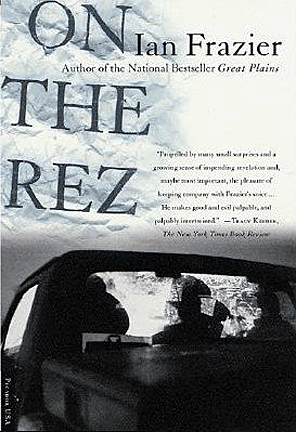|
| |
On the Rez
by
Ian Frazier
Picador
ISBN-10: 9780312278595
 In
his book, On the Rez, Ian Frazier takes his readers to the Pine Ridge
Indian Reservation in South Dakota. Here, he introduces them to the
descendants of the Oglala Sioux, to those directly related to Crazy
Horse, one of the greatest Native American leaders of the 19th century. In
his book, On the Rez, Ian Frazier takes his readers to the Pine Ridge
Indian Reservation in South Dakota. Here, he introduces them to the
descendants of the Oglala Sioux, to those directly related to Crazy
Horse, one of the greatest Native American leaders of the 19th century.
Much of this book revolves around a Oglala Sioux named Le War Lance,
whom Frazier first met researching his best-seller Great Plains. This
yarn-spinning, beer-swilling figure, introduces Frasier to the hard
facts of reservation life. In fact, their friendship, with its deep
affection and dependency, anchors the entire narrative.
Throughout the book, Le introduces his brother and sisters, uncle and
aunt, even the graves of his parents and other brothers, endlessly
spinning wild yarns that Frazier reproduces without judgment. Elements
of tragedy—a drunk driver kills the girlfriend of Le's brother—mingle
with near-misses—a hose breaks, enveloping the family in a cloud of
propane gas—but all this is the normal state of affairs at Pine Ridge.
In this in-depth portrait of a forgotten people, Frasier shows that
while Native Americans today should be treated like any other ethnic
group, in many cases, they’re not. Life on this reservation isn’t much
different than life in poverty-stricken urban ghettos, with one
exception. Here, many of the Oglala Sioux continue to practice their
ancient traditions, keeping alive the spirits of their ancestors. In
doing so, they’ve forged a strong connection to their past.
This book isn’t so much about a place, but more about those who inhabit
it. On numerous trips to Pine Ridge and the small communities contained
within its boundaries, Frasier meets an assortment of characters.
Frazier's visits to Pine Ridge and Wounded Knee, and to the descendants
of Red Cloud and Black Elk, frame a broad meditation on American
history, myth and misconception. Funny and sad, but never bleak, his
meandering narrative is, in fact, the composite of many voices and many
kinds of history.
Some early chapters are about the state of particular tribes today,
including statistics. Much of this information will be new to most
readers.
After starting with an uncharacteristic rant about modern American
culture, he settles into his quietly observed adventures with Le War
Lance and his friend, Floyd John, whom he fascinatedly and exasperatedly
follows—and often drives—around their reservation. He follows up the
reputations of local heroes like Crazy Horse, Red Cloud, and a high
school basketball star named SuAnne Big Crow by visiting and talking
with their relatives and ancestors. While also making sidetrips into the
Lakota language, Wounded Knee, Sioux political history, and the national
disappearance of Indian bars, Frazier's broader interest is in the
influence of Indian ideas of bravery and human freedom on the American
character. But the story always veers back to details about living on
the reservation, a landscape "dense with stories." He describes the junk
he sees along the side of the road, what it’s like to be caught in a
sudden snow squall, and the joy of attending a summer powwow in a field.
Frazier enlivens accounts of his own travels through a keen eye for
detail. On the Rez may be the best and most truthful book about the
American Indian available today. |
Buy this book...
< Back to Book Reviews
Go to next book review >
|
